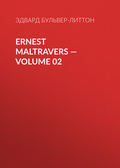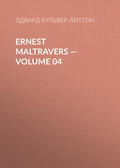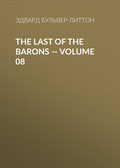
Эдвард Бульвер-Литтон
"My Novel" — Volume 07
CHAPTER IX
Nothing, perhaps, could have severed Leonard from Burley but Helen's return to his care. It was impossible for him, even had there been another room in the house vacant (which there was not), to install this noisy, riotous son of the Muse by Bacchus, talking at random and smelling of spirits, in the same dwelling with an innocent, delicate, timid, female child. And Leonard could not leave her alone all the twenty-four hours. She restored a home to him and imposed its duties. He therefore told Mr. Burley that in future he should write and study in his own room, and hinted, with many a blush, and as delicately as he could, that it seemed to him that whatever he obtained from his pen ought to be halved with Burley, to whose interest he owed the employment, and from whose books or whose knowledge he took what helped to maintain it; but that the other half, if his, he could no longer afford to spend upon feasts or libations. He had another life to provide for.
Burley pooh-poohed the notion of taking half his coadjutor's earning with much grandeur, but spoke very fretfully of Leonard's sober appropriation of the other half; and though a good-natured, warm-hearted man, felt extremely indignant at the sudden interposition of poor Helen. However, Leonard was firm; and then Burley grew sullen, and so they parted. But the rent was still to be paid. How? Leonard for the first time thought of the pawnbroker. He had clothes to spare, and Riccabocca's watch. No; that last he shrank from applying to such base uses.
He went home at noon, and met Helen at the street-door. She too had been out, and her soft cheek was rosy red with unwonted exercise and the sense of joy. She had still preserved the few gold pieces which Leonard had taken back to her on his first visit to Miss Starke's. She had now gone out and bought wool and implements for work; and meanwhile she had paid the rent.
Leonard did not object to the work, but he blushed deeply when he knew about the rent, and was very angry. He paid back to her that night what she had advanced; and Helen wept silently at his pride, and wept more when she saw the next day a woful hiatus in his wardrobe.
But Leonard now worked at home, and worked resolutely; and Helen sat by his side, working too; so that next day, and the next, slipped peacefully away, and in the evening of the second he asked her to walk out in the fields. She sprang up joyously at the invitation, when bang went the door, and in reeled John Burley,—drunk,—and so drunk!
CHAPTER X
And with Burley there reeled in another man,—a friend of his, a man who had been a wealthy trader and once well to do, but who, unluckily, had literary tastes, and was fond of hearing Burley talk. So, since he had known the wit, his business had fallen from him, and he had passed through the Bankrupt Court. A very shabby-looking dog he was, indeed, and his nose was redder than Burley's.
John made a drunken dash at poor Helen. "So you are the Pentheus in petticoats who defies Bacchus," cried he; and therewith he roared out a verse from Euripides. Helen ran away, and Leonard interposed.
"For shame, Burley!"
"He's drunk," said Mr. Douce, the bankrupt trader, "very drunk; don't mind him. I say, sir, I hope we don't intrude. Sit still, Burley, sit still, and talk, do,—that's a good man. You should hear him—ta—ta— talk, sir." Leonard meanwhile had got Helen out of the room into her own, and begged her not to be alarmed, and keep the door locked. He then returned to Burley, who had seated himself on the bed, trying wondrous hard to keep himself upright; while Mr. Douce was striving to light a short pipe that he carried in his button-hole—without having filled it— and, naturally failing in that attempt, was now beginning to weep.
Leonard was deeply shocked and revolted for Helen's sake; but it was hopeless to make Burley listen to reason. And how could the boy turn out of his room the man to whom he was under obligations?
Meanwhile there smote upon Helen's shrinking ears loud jarring talk and maudlin laughter, and cracked attempts at jovial songs. Then she heard Mrs. Smedley in Leonard's room, remonstrating; and Burley's laugh was louder than before, and Mrs. Smedley, who was a meek woman, evidently got frightened, and was heard in precipitate retreat. Long and loud talk recommenced, Burley's great voice predominant, Mr. Douce chiming in with hiccoughy broken treble. Hour after hour this lasted, for want of the drink that would have brought it to a premature close. And Burley gradually began to talk himself somewhat sober. Then Mr. Douce was heard descending the stairs, and silence followed. At dawn, Leonard knocked at Helen's door. She opened it at once, for she had not gone to bed.
"Helen," said he, very sadly, "you cannot continue here. I must find out some proper home for you. This man has served me when all London was friendless, and he tells me that he has nowhere else to go,—that the bailiffs are after him. He has now fallen asleep. I will go and find you some lodging close at hand, for I cannot expel him who has protected me; and yet you cannot be under the same roof with him. My own good angel, I must lose you."
He did not wait for her answer, but hurried down stairs. The morning looked through the shutterless panes in Leonard's garret, and the birds began to chird from the elmtree, when Burley rose and shook himself, and stared round. He could not quite make out where he was. He got hold of the water-jug, which he emptied at three draughts, and felt greatly refreshed. He then began to reconnoitre the chamber,—looked at Leonard's manuscripts, peeped into the drawers, wondered where the devil Leonard himself had gone to, and finally amused himself by throwing down the fireirons, ringing the bell, and making all the noise he could, in the hopes of attracting the attention of somebody or other, and procuring himself his morning dram.
In the midst of this charivari the door opened softly, but as if with a resolute hand, and the small quiet form of Helen stood before the threshold. Burley turned round, and the two looked at each other for some moments with silent scrutiny.
BURLEY (composing his features into their most friendly expression).— "Come hither, my dear. So you are the little girl whom I saw with Leonard on the banks of the Brent, and you have come back to live with him,—and I have come to live with him too. You shall be our little housekeeper, and I will tell you the story of Prince Pettyman, and a great many others not to be found in 'Mother Goose.' Meanwhile, my dear little girl, here's sixpence,—just run out and change this for its worth in rum."
HELEN (coming slowly up to Mr. Burley, and still gazing earnestly into his face).—"Ah, sir, Leonard says you have a kind heart, and that you have served him; he cannot ask you to leave the house; and so I, who have never served him, am to go hence and live alone."
BURLEY (moved).—"You go, my little lady; and why? Can we not all live together?"
HELEN.—"No, sir. I left everything to come to Leonard, for we had met first at my father's grave; but you rob me of him, and I have no other friend on earth."
BURLEY (discomposed).—"Explain yourself. Why must you leave him because I come?"
Helen looked at Mr. Burley again, long and wistfully, but made no answer.
BURLEY (with a gulp).—"Is it because he thinks I am not fit company for you?"
Helen bowed her head.
Burley winced, and after a moment's pause said, "He is right."
HELEN (obeying the impulse of her heart, springs forward and takes Burley's hand).—"Ah, sir," she cried, "before he knew you he was so different; then he was cheerful, then, even when his first disappointment came, I grieved and wept but I felt he would conquer still, for his heart was so good and pure. Oh, sir, don't think I reproach you; but what is to become of him if—if—-No, it is not for myself I speak. I know that if I was here, that if he had me to care for, he would come home early, and work patiently, and—and—that I might save him. But now when I am gone, and you live with him,—you to whom he is grateful, you whom he would follow against his own conscience (you must see that, sir), what is to become of him?"
Helen's voice died in sobs.
Burley took three or four long strides through the room; he was greatly agitated. "I am a demon," he murmured. "I never saw it before; but it is true, I should be this boy's ruin." Tears stood in his eyes, he paused abruptly, made a clutch at his hat, and turned to the door.
Helen stopped the way, and taking him gently by the arm, said, "Oh, sir, forgive me,—I have pained you;" and looked up at him with a compassionate expression, that indeed made the child's sweet face as that of an angel.
Burley bent down as if to kiss her, and then drew back, perhaps with a sentiment that his lips were not worthy to touch that innocent brow.
"If I had had a sister,—a child like you, little one," he muttered, "perhaps I too might have been saved in time. Now—"
"Ah, now you may stay, sir; I don't fear you any more."
"No, no; you would fear me again ere night-time, and I might not be always in the right mood to listen to a voice like yours, child. Your Leonard has a noble heart and rare gifts. He should rise yet, and he shall. I will not drag him into the mire. Good-by,—you will see me no more." He broke from Helen, cleared the stairs with a bound, and was out of the house.
When Leonard returned he was surprised to hear his unwelcome guest was gone,—but Helen did not venture to tell him of her interposition. She knew instinctively how such officiousness would mortify and offend the pride of man; but she never again spoke harshly of poor Burley. Leonard supposed that he should either see or hear of the humourist in the course of the day. Finding he did not, he went in search of him at his old haunts; but no trace. He inquired at the "Beehive" if they knew there of his new address, but no tidings of Burley could be obtained.
As he came home disappointed and anxious, for he felt uneasy as to the disappearance of his wild friend, Mrs. Smedley met him at the door.
"Please, sir, suit yourself with another lodging," said she. "I can have no such singings and shoutings going on at night in my house. And that poor little girl, too! you should be ashamed of yourself."
Leonard frowned, and passed by.
CHAPTER XI
Meanwhile, on leaving Helen, Burley strode on; and, as if by some better instinct, for he was unconscious of his own steps, he took his way towards the still green haunts of his youth. When he paused at length, he was already before the door of a rural cottage, standing alone in the midst of fields, with a little farmyard at the back; and far through the trees in front was caught a glimpse of the winding Brent.
With this cottage Burley was familiar; it was inhabited by a good old couple who had known him from a boy. There he habitually left his rods and fishing-tackle; there, for intervals in his turbid, riotous life, he had sojourned for two or three days together, fancying the first day that the country was a heaven, and convinced before the third that it was a purgatory.
An old woman, of neat and tidy exterior, came forth to greet him.
"Ah, Master John," said she, clasping his nerveless hand, "well, the fields be pleasant now; I hope you are come to stay a bit? Do; it will freshen you; you lose all the fine colour you had once, in Lunnon town."
"I will stay with you, my kind friend," said Burley, with unusual meekness; "I can have the old room, then?"
"Oh, yes, come and look at it. I never let it now to any one but you, —never have let it since the dear beautiful lady with the angel's face went away. Poor thing, what could have become of her?"
Thus speaking, while Burley listened not, the old woman drew him within the cottage, and led him up the stairs into a room that might have well become a, better house, for it was furnished with taste, and even elegance. A small cabinet pianoforte stood opposite the fireplace, and the window looked upon pleasant meads and tangled hedgerows, and the narrow windings of the blue rivulet. Burley sank down exhausted, and gazed wistfully from the casement.
"You have not breakfasted?" said the hostess, anxiously.
"No."
"Well, the eggs are fresh laid, and you would like a rasher of bacon, Master John? And if you will have brandy in your tea, I have some that you left long ago in your own bottle."
Burley shook his head. "No brandy, Mrs. Goodyer; only fresh milk. I will see whether I can yet coax Nature."
Mrs. Goodyer did not know what was meant by coaxing Nature, but she said," Pray do, Master John," and vanished. That day Burley went out with his rod, and he fished hard for the one-eyed perch; but in vain. Then he roved along the stream with his hands in his pockets, whistling. He returned to the cottage at sunset, partook of the fare provided for him, abstained from the brandy, and felt dreadfully low.
He called for pen, ink, and paper, and sought to write, but could not achieve two lines. He summoned Mrs. Goodyer. "Tell your husband to come and sit and talk."
Up came old Jacob Goodyer, and the great wit bade him tell him all the news of the village. Jacob obeyed willingly, and Burley at last fell asleep. The next day it was much the same, only at dinner he had up the brandy-bottle, and finished it; and he did not have up Jacob, but he contrived to write.
The third day it rained incessantly. "Have you no books, Mrs. Goodyer?" asked poor John Burley.
"Oh, yes, some that the dear lady left behind her; and perhaps you would like to look at some papers in her own writing?"
"No, not the papers,—all women scribble, and all scribble the same things. Get me the books."
The books were brought up,—poetry and essays—John knew them by heart. He looked out on the rain, and at evening the rain had ceased. He rushed to his hat and fled.
"Nature, Nature!" he exclaimed, when he was out in the air and hurrying by the dripping hedgerows, "you are not to be coaxed by me! I have jilted you shamefully, I own it; you are a female, and unforgiving. I don't complain. You may be very pretty, but you are the stupidest and most tire some companion that ever I met with. Thank Heaven, I am not married to you!"
Thus John Burley made his way into town, and paused at the first public- house. Out of that house he came with a jovial air, and on he strode towards the heart of London. Now he is in Leicester Square, and he gazes on the foreigners who stalk that region, and hums a tune; and now from yonder alley two forms emerge, and dog his careless footsteps; now through the maze of passages towards St. Martin's he threads his path, and, anticipating an orgy as be nears his favourite haunts, jingles the silver in his pockets; and now the two forms are at his heels.
"Hail to thee, O Freedom!" muttered John Burley, "thy dwelling is in cities, and thy palace is the tavern."
"In the king's name," quoth a gruff voice; and John Burley feels the horrid and familiar tap on the shoulder.
The two bailiffs who dogged have seized their prey. "At whose suit?" asked John Burley, falteringly. "Mr. Cox, the wine-merchant."
"Cox! A man to whom I gave a check on my bankers not three months ago!"
"But it war n't cashed."
"What does that signify?—the intention was the same. A good heart takes the will for the deed. Cox is a monster of ingratitude, and I withdraw my custom."
"Sarve him right. Would your honour like a jarvey?"
"I would rather spend the money on something else," said John Burley. "Give me your arm, I am not proud. After all, thank Heaven, I shall not sleep in the country."
And John Burley made a night of it in the Fleet.
CHAPTER XII
Miss Starke was one of those ladies who pass their lives in the direst of all civil strife,—war with their servants. She looked upon the members of that class as the unrelenting and sleepless enemies of the unfortunate householders condemned to employ them. She thought they ate and drank to their villanous utmost, in order to ruin their benefactors; that they lived in one constant conspiracy with one another and the tradesmen, the object of which was to cheat and pilfer. Miss Starke was a miserable woman. As she had no relations or friends who cared enough for her to share her solitary struggle against her domestic foes; and her income, though easy, was an annuity that died with herself, thereby reducing various nephews, nieces, or cousins to the strict bounds of a natural affection,—that did not exist; and as she felt the want of some friendly face amidst this world of distrust and hate,—so she had tried the resource of venal companions. But the venal companions had never stayed long, either they disliked Miss Starke, or Miss Starke disliked them. Therefore the poor woman had resolved upon bringing up some little girl, whose heart, as she said to herself, would be fresh and uncorrupted, and from whom she might expect gratitude. She had been contented, on the whole, with Helen, and had meant to keep that child in her house as long as she (Miss Starke) remained upon the earth,—perhaps some thirty years longer; and then, having carefully secluded her from marriage and other friendship, to leave her nothing but the regret of having lost so kind a benefactress. Conformably with this notion, and in order to secure the affections of the child, Miss Starke had relaxed the frigid austerity natural to her manner and mode of thought, and been kind to Helen in an iron way. She had neither slapped nor pinched her, neither had she starved. She had allowed her to see Leonard, according to the agreement made with Dr. Morgan, and had laid out tenpence on cakes, besides contributing fruit from her garden for the first interview,—a hospitality she did not think it fit to renew on subsequent occasions. In return for this, she conceived she had purchased the right to Helen bodily and spiritually, and nothing could exceed her indignation when she rose one morning and found the child had gone. As it never had occurred to her to ask Leonard's address, though she suspected Helen had gone to him, she was at a loss what to do, and remained for twenty-four hours in a state of inane depression. But then she began to miss the child so much that her energies woke, and she persuaded herself that she was actuated by the purest benevolence in trying to reclaim this poor creature from the world into which Helen had thus rashly plunged.
Accordingly she put an advertisement into the "Times," to the following effect, liberally imitated from one by which in former years she had recovered a favourite Blenheim:—
TWO GUINEAS' REWARD
STRAYED, from Ivy Cottage, Highgate, a Little Girl,—answers to the name of Helen; with blue eyes and brown hair; white muslin frock, and straw hat with blue ribbons. Whoever will bring the same to Ivy Cottage, shall receive the above Reward.
N. B.—-Nothing more will be offered.
Now it so happened that Mrs. Smedley had put an advertisement in the "Times" on her own account, relative to a niece of hers who was coming from the country, and for whom she desired to find a situation. So, contrary to her usual habit, she sent for the newspaper, and close by her own advertisement, she saw Miss Starke's.
It was impossible that she could mistake the description of Helen; and as this advertisement caught her eye the very day after the whole house had been disturbed and scandalized by Burley's noisy visit, and on which she had resolved to get rid of a lodger who received such visitors, the good- hearted woman was delighted to think that she could restore Helen to some safe home. While thus thinking, Helen herself entered the kitchen where Mrs. Smedley sat, and the landlady had the imprudence to point out the advertisement, and talk, as she called it, "seriously," to the little girl.
Helen in vain and with tears entreated her to take no step in reply to the advertisement. Mrs. Smedley felt that it was an affair of duty, and was obdurate, and shortly afterwards put on her bonnet and left the house. Helen conjectured that she was on her way to Miss Starke's, and her whole soul was bent on flight. Leonard had gone to the office of the "Beehive" with his manuscripts; but she packed up all their joint effects, and just as she had done so, he returned. She communicated the news of the advertisement, and said she should be so miserable if compelled to go back to Miss Starke's, and implored him so pathetically to save her from such sorrow, that he at once assented to her proposal of flight. Luckily, little was owing to the landlady,—that little was left with the maid-servant; and, profiting by Mrs. Smedley's absence, they escaped without scene or conflict. Their effects were taken by Leonard to a stand of hackney vehicles, and then left at a coach-office while they went in search of lodgings. It was wise to choose an entirely new and remote district; and before night they were settled in an attic in Lambeth.







